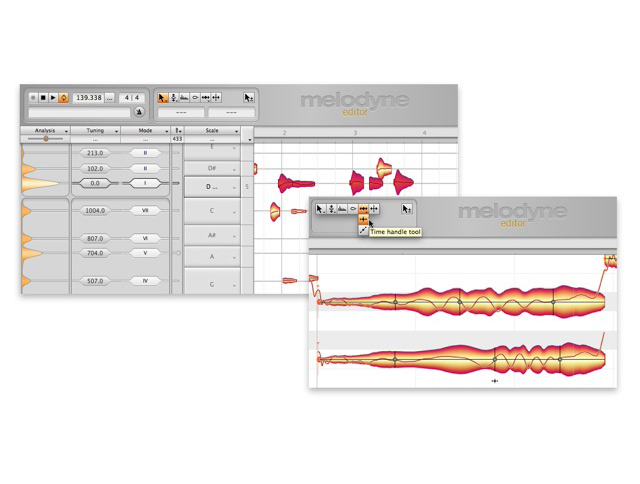Celemony Melodyne Editor 2 unveiled

With Melodyne Editor and its Direct Note Access technology, Celemony brought something genuinely different to the digital audio manipulation table, and now it's attempting to raise the bar once again with the launch of Melodyne Editor 2.
This ups the ante by enabling users to work with different scales and temperaments, and also contains more powerful timing tools.
More details in the press release below; Melodyne Editor 2 will be released in November priced at $/€399, with users of the first version being able to update for $/€99.
Celemony Melodyne Editor 2
Celemony Software GmbH is proud to present Version 2 of Melodyne editor at the AES in New York. The new version offers unique possibilities for working with different scales and temperaments, more powerful timing tools, Rewire integration, and numerous other improvements. As a result, Melodyne is even more musical, allows you to go even deeper when editing your material, and is even more widely compatible than ever before. Melodyne editor 2 will be available in November for US$/€ 399, the update costing US$/€ 99.
Not all music is played on white and black keys, true intonation is complex. Other cultures have musical traditions in which Mozart and Beethoven do not loom large, and absolute flexibility is also needed in experimental music. Powerful reasons for opening up totally new musical worlds with Melodyne editor 2. The new True Scale & Tuning functions offer those who produce Arab, Indian or contemporary and microtonal music the ideal function set for editing their work with Melodyne. True Scale & Tuning also has the power to enhance conventional music production, by making it easy for users to explore the emotional and atmospheric subtleties of different scales and temperaments and integrate them into their own music. Countless different scales and temperaments can be loaded, edited in detail, and even created from scratch. The highlight is the Scale Detective, which is capable of analyzing any sample or piece of music and allows even users with no detailed knowledge to transfer the scale and tuning of one recording to another.
With its note-based way of working Melodyne has always allowed the editing of highly specific aspects of timing, but the function set of Melodyne editor 2 is even more powerful in this respect. The new Attack Speed tool allows you to edit the starting transients, that are so determinative of the sound - even for each note separately. An important new design implement, not only for percussive sounds. In addition, with the new Time Handles, even time progressions within individual notes can be reshaped. Among other things, this makes even more detailed editing of vocals possible.
Melodyne is intended to be of use to as many producers as possible - regardless which DAW they use. For this reason, Melodyne editor 2 now also supports Rewire. This means it can operate now even with DAWs that lack plug-in interfaces or were previously incompatible with Melodyne.
Want all the hottest music and gear news, reviews, deals, features and more, direct to your inbox? Sign up here.
The update to Version 2 brings other minor improvements and workflow optimizations that along with Rewire integration are also included in the free updates to Version 2 of Melodyne assistant and essential.
Melodyne editor 2 will be available in November 2011 for US$/€ 399. The update from Version 1 will cost US$/€ 99, but is free of charge to users who registered Melodyne editor after October 1, 2011. At the same time as the update to Melodyne editor 2, free updates to Version 2 of Melodyne assistant and essential will be released, as well as an updated trial version that allows you to test Melodyne editor for 30 days without any limitations. Celemony will inform all Melodyne users by newsletter as soon as the updates are available.

I’m the Deputy Editor of MusicRadar, having worked on the site since its launch in 2007. I previously spent eight years working on our sister magazine, Computer Music. I’ve been playing the piano, gigging in bands and failing to finish tracks at home for more than 30 years, 24 of which I’ve also spent writing about music and the ever-changing technology used to make it.